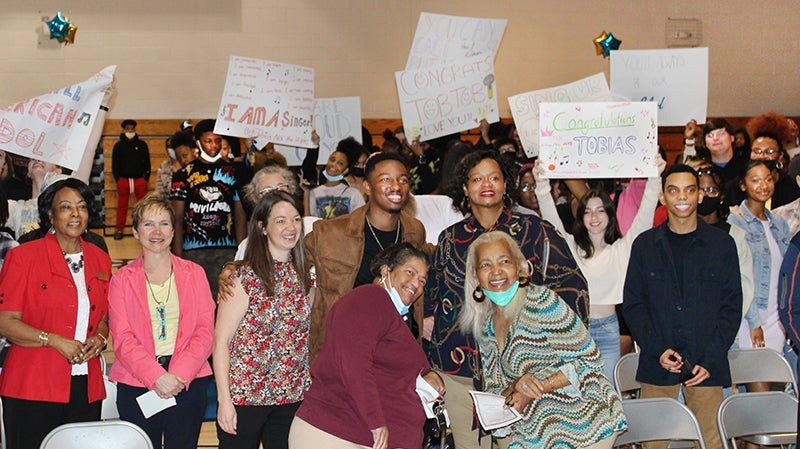Pink Power!
Published 9:05 am Tuesday, October 28, 2014
By Cheryl Deloatch
Correspondent
AHOSKIE – “Pink Power Luncheon – Celebrating the Power of YOU!” was the theme for a Breast Cancer Awareness Month held Oct. 16 at Carpenter’s Shop Church.
This annual event, sponsored by Vidant Roanoke-Chowan Hospital, attracted 322 participants, mostly women, who were either breast cancer survivors or knew someone who had endured the disease.
Lisa Newsome, Director of Marketing and Community Relations for the hospital, gave the opening. Sue Lassiter, Hospital President, welcomed participants to the speech and luncheon.
Following a healthy lunch, Newsome introduced Dr. Michael Hopkins, a fellowship-trained cancer specialist who has joined the hematology and oncology team at the hospital. He earned his medical degree at Chicago Medical School and completed an internship at Portsmouth (Virginia) Naval Hospital. His professional training also includes a hematology and oncology fellowship at Scripps Clinic in San Diego.
In his speech, “What You Need to Know About Breast Cancer,” Hopkins said that about one in eight women in the United States, or 12 percent, will develop invasive breast cancer during their lifetimes.
“Also, an estimated 9,000 women in North Carolina will be diagnosed with breast cancer this year,” he said.
He shared risk factors for breast cancer that cannot be changed. These are gender, aging, genetics, family and personal history of breast cancer, and race.
“As you get older, if your health isn’t so good, you’re more likely to develop breast cancer,” Hopkins said. “Sometimes race can be a factor. Breast cancer is more common in Caucasian women, less common in Hispanic women, and somewhat low for African-American women.
“People who have benign breast masses are at an increased risk of developing breast cancer,” he added. “Also, one percent of males are likely to develop breast cancer.”
Hopkins explained lifestyle related risk factors, or things that a person can change.
“Post-menopausal hormone therapy (PHT) can be a factor,” he remarked. “If you have your first child after age thirty or do not have any children, you’re at an increased risk of developing breast cancer.”
Other factors a person can change include having a sedentary lifestyle, being overweight or obese, and consuming alcohol.
“Be aware of any change in your breast or underarm area,” Hopkins said. “If you notice any of the following signs, see your health care provider.”
Some symptoms include lumps, hard knots or thickening inside the breast or underarm, dimpling or puckering of the skin, and a difference in the sizes of the breasts.
“If your breasts have different sizes, like one is now a C-cup and the other is another size, that could be a sign of cancer.”
Hopkins emphasized the importance of early detection. “Ninety-eight percent of women who are diagnosed with breast cancer in the earliest stage survive,” he said. “If we wait until it has spread from the breasts to the lymph nodes in the armpits, lungs or bones, we can’t cure it. We’re doing really well right now and we want to keep doing well.”
Hopkins shared recommendations from the American Cancer Society. One is for women 40 years of age and older to have mammograms every year.
“Regular breast self-examinations should begin when women are in their twenties,” he said. “You know your breasts better than anybody else does.”
“Women who are at high risk should discuss with their doctor the benefits of getting an MRI and a mammogram every year. Women at high risk are those who have family members with breast cancer or ovarian cancer,” he said. “A lot of people have them at younger ages. If you do, see your medical provider, because you may have a genetic predisposition to develop very early breast cancer. It may be very aggressive, and we would do more aggressive screenings in these cases.”
Newsome next introduced the keynote speaker, Kelly Swanson. Swanson, a North Carolina resident, is an award-winning storyteller, comedian, motivational speaker, and author of “Who Hijacked My Fairy Tale.”
Swanson sees how women get stuck in a pot hole along the yellow brick road of life – the place where the life they’ve envisioned meets the life they have. This wife and mother is the poster child for a woman who has let excuses stand in the way but is looking in the mirror and deciding that it’s time to make a change.
Swanson began her speech by literally looking into her mirror. She made self-deprecating statements for the first few minutes. Then, she looked at the audience and asked, “What is your inner voice telling you? You control the story you write.”
Swanson entertained the audience with her Southern wit and humor. She painted a lively picture of the South with such descriptions as, “We keep the sofas on the front porch” and “We end all our sentences with ‘bless your heart.”
Then, Swanson became serious. She talked about the importance of believing in and trusting oneself. She discussed the importance of being proactive (planning ahead) versus being reactive (taking action after something has happened). She encouraged the audience to see, believe, do, and trust. “I will see, I will believe, I will do, and I will trust my cape,” she advised.
Swanson added a personal element when speaking about self-trust.
“My son sometimes likes to pretend he is a superhero and wears his cape. When I ask what he is doing, he says, ‘I am trusting my cape, Mama.’ At some point in life, you just have to jump and trust your cape,” Swanson said. “If you miss your mark, you won’t even care.”
Swanson motivated the audience by saying,” It’s not about looking like a princess, but feeling like a princess.”
She was very well-received by the audience. Several times, the guests applauded and some even said, “Amen.”
Swanson could be described as a preacher with a sense of humor. This North Carolina girl concluded her speech by saying, “I am convinced I was sent here today for a reason.”


